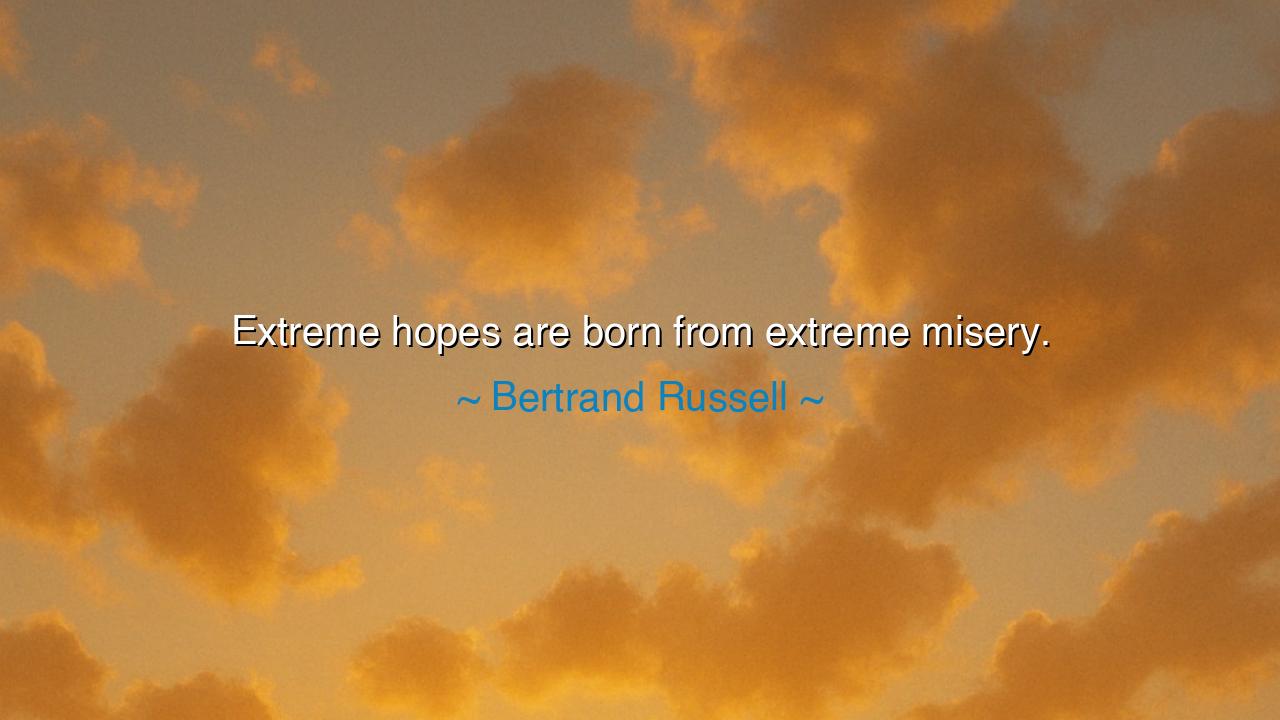
Extreme hopes are born from extreme misery.






The words of Bertrand Russell — “Extreme hopes are born from extreme misery” — speak with the force of a truth carved into the heart of human history. In this brief sentence, Russell reveals the paradox of existence: that the brightest flames of hope often rise from the darkest ashes of suffering. It is not in comfort that the soul learns to dream of freedom, nor in prosperity that men imagine paradise. Rather, when life’s weight becomes unbearable, the spirit of humanity forges visions of a better world — visions born from pain, yet radiant with possibility. Misery is the womb of transformation, and hope, its most divine child.
In the ancient world, the philosophers and poets knew this truth well. The Greeks told of Pandora’s box, from which all the evils of the world escaped — envy, disease, war, and death — yet one thing remained at the bottom: Hope. Even amidst ruin, the gods left humankind a single gift — a light to pierce despair. Russell, in his modern wisdom, merely reawakens this ancient lesson. For it is when the human heart is broken that it dares to imagine wholeness; when the night is longest that it begins to pray for dawn. The extremes of misery are not the end of life, but the soil from which renewal grows.
History itself is a monument to this truth. When Europe lay in ruins after the Second World War, cities reduced to rubble and nations to grief, it was from that misery that the dream of unity arose — the hope of peace that birthed the European Union. When enslaved peoples groaned under the chains of centuries, their cries gave birth to movements of liberation, to the unyielding fire of freedom that no tyranny could extinguish. So too, when Nelson Mandela emerged from twenty-seven years in a cell, he carried not vengeance, but hope for reconciliation — hope born not in comfort, but in suffering. Every age of despair has given rise to prophets of renewal, because misery, when endured with courage, becomes the forge of vision.
And yet, this truth is not only for nations; it is for every soul. There are times when life wounds us so deeply that we think no healing is possible. But it is precisely then — when all seems lost — that the seed of hope begins to stir. The ancients would say that suffering awakens the hidden gods within us, compelling the spirit to rise beyond its mortal limits. One who has never suffered cannot truly know compassion; one who has never fallen cannot understand the strength of rising. Extreme misery strips away illusions and reveals what is essential — and in that revelation, hope takes root.
Even Russell, a man of reason and logic, saw that the heart of humanity cannot live on intellect alone. He witnessed two world wars, the collapse of empires, the terror of ideologies — yet he understood that despair, though dark, often gives birth to the light of progress. When reason sees only ruin, hope dares to imagine redemption. It is hope that leads survivors to rebuild, mothers to forgive, and dreamers to begin anew. Thus, the philosopher’s words are not a lament, but a recognition of the divine equilibrium that governs life — that from every abyss, a star is born.
But beware, for hope born of misery is not mere wishful thinking. It is forged in agony and therefore carries the weight of truth. Such hope demands action, sacrifice, and faith. It is not enough to dream of better days; one must rise and work for them. The oppressed must fight not with hatred but with vision; the grieving must rebuild not out of denial, but out of love. This is the path by which misery is transformed into greatness — by choosing to let pain shape, not shatter, the soul.
So remember this, child of tomorrow: when life seems unbearable, when your heart feels crushed beneath the burden of sorrow, do not believe you are forsaken. For it is in that very hour that hope is being born within you, fierce and bright as the morning sun. Suffering is the crucible that purifies the human spirit. Embrace your pain not as an enemy, but as the silent teacher that prepares you for new life. For as Russell taught — and as every age has proven — it is in the extremes of misery that humanity learns its most powerful lesson: that hope, once born, is stronger than despair, and from ruin, the soul can rise again.






AAdministratorAdministrator
Welcome, honored guests. Please leave a comment, we will respond soon